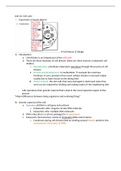Bio115 - Study guides, Class notes & Summaries
Looking for the best study guides, study notes and summaries about Bio115? On this page you'll find 17 study documents about Bio115.
Page 2 out of 17 results
Sort by
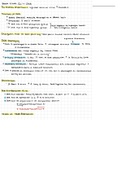
-
The Cellular Basis of Life Book Notes (BIO115)
- Class notes • 29 pages • 2022
-
- $6.49
- + learn more
In-depth notes taken from the book used for the course 'The cellular basis of life' (BIO115) at Murray State University. Includes diagrams, definitions, explanations, examples, and images using terminology that can be easily understood. ONLY INCLUDES THE FIRST HALF.
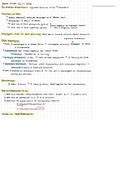
-
The Cellular Basis of Life Book Notes (BIO115)
- Class notes • 29 pages • 2022
-
- $6.49
- + learn more
In-depth notes taken from the book used for the course 'The cellular basis of life' (BIO115) at Murray State University. Includes diagrams, definitions, explanations, examples, and images using terminology that can be easily understood. ONLY INCLUDES THE FIRST HALF.
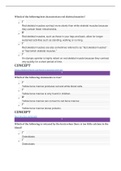
-
BIO 115 Milestone 2_Bio115 Milestone 2 Questions and Answers Latest Version
- Exam (elaborations) • 6 pages • 2021
-
- $12.70
- + learn more
Which of the following best characterizes red skeletal muscles? • Red skeletal muscles contract more slowly than white skeletal muscles because they contain fewer mitochondria. • Red skeletal muscles, such as those in your legs and back, allow for longer sustained activities such as standing, walking or running. • Red skeletal muscles are also sometimes referred to as "fast skeletal muscles" or "fast-twitch skeletal muscles." • An olympic sprinter is highly reliant on...
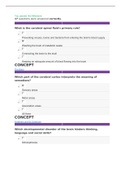
-
BIO 115 Milestone 3_Bio115 Milestone 3 Questions and Answers Latest Version
- Exam (elaborations) • 7 pages • 2021
-
- $12.90
- + learn more
You passed this Milestone 17 questions were answered correctly. 1 What is the cerebral spinal fluid's primary role? • Preventing viruses, toxins and bacteria from entering the brain's blood supply • Washing the brain of metabolic waste • Connecting the brain to the skull • Keeping an adequate amount of blood flowing into the brain CONCEPT The Brain 2 Which part of the cerebral cortex interprets the meaning of sensations? • Sensory areas • Motor areas ...
Class notes General Biology 1 (Bio115)- Unit 10: Cell cycle cell cycle, chromosome number and structure, ploidy, phases
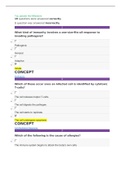
-
BIO 115 Milestone 4_Bio115 Milestone 4 Questions and Answers Latest Version
- Exam (elaborations) • 8 pages • 2021
-
- $13.00
- + learn more
You passed this Milestone 19 questions were answered correctly. 1 question was answered incorrectly. 1 What kind of immunity involves a one-size-fits-all response to invading pathogens? • Pathogenic • General • Adaptive • Innate CONCEPT Pathogens 2 Which of these occur once an infected cell is identified by cytotoxic T-cells? • The cell releases helper T-cells. • The cell digests the pathogen. • The cell starts to replicate. • The cell unde...
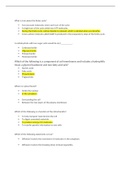
-
BIO 115 Milestone 1_Bio115 Milestone 1 Questions and Answers Latest Version
- Exam (elaborations) • 5 pages • 2021
-
- $12.60
- + learn more
What is true about the Krebs cycle? • Two pyruvate molecules enter each turn of the cycle. • A single turn of the cycle yields two ATP molecules. • During the Krebs cycle, carbon dioxide is released, which is exhaled when you breathe. • A two carbon molecule called NADH is produced in the preparatory steps of the Krebs cycle. 2 A carbohydrate with two sugar units would be a(n) __________. • Carbosaccharide • Oligosaccharide • Polysaccharide • Monosaccharide Which of th...

Study stress? For sellers on Stuvia, these are actually golden times. KA-CHING! Earn from your study resources too and start uploading now. Discover all about earning on Stuvia

